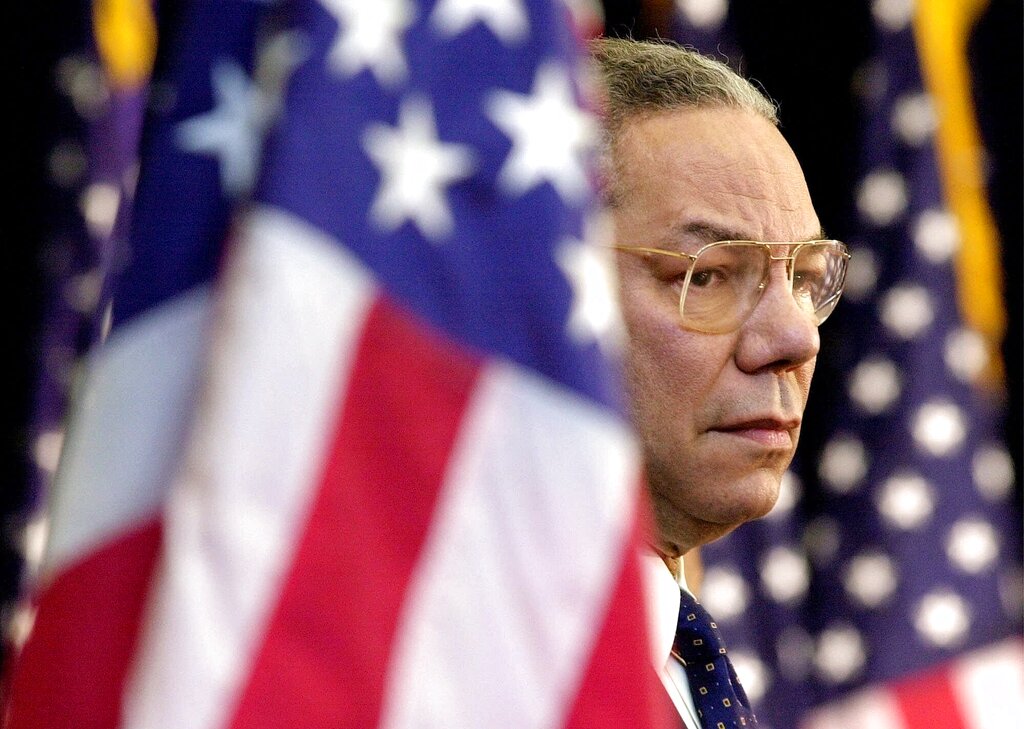Colin Powell, who served Democratic and Republican presidents in war and peace, has passed away at the age of 84.
Powell was the first Black secretary of state, the youngest and first African American chairman of the Joint Chiefs of Staff under President George H.W. Bush and was the first Black national security adviser during the end of the presidency of Ronald Reagan.
Powell died of complications from COVID-19, though he was fully vaccinated.
His family wrote on Facebook, "We have lost a remarkable and loving husband, father, grandfather and a great American." Powell had been treated at Walter Reed National Medical Center in Bethesda, Maryland.

Former President George W. Bush said he and former first lady Laura Bush were “deeply saddened” by Powell's death.
“He was a great public servant” and “widely respected at home and abroad,” Bush said. "And most important, Colin was a family man and a friend. Laura and I send Alma and their children our sincere condolences as they remember the life of a great man.”
Defense Secretary Lloyd Austin, a retired Army general, said the news of Powell's death left “a hole in my heart.”
“The world lost one of the greatest leaders that we have ever witnessed,” Austin said while traveling in Europe. “Alma lost a great husband and the family lost a tremendous father and I lost a tremendous personal friend and mentor. He has been my mentor for a number of years. He always made time for me and I can always go to him with tough issues, he always had great counsel.”
As chairman of the Joint Chiefs, Powell oversaw the U.S. invasion of Panama and later the U.S. invasion of Kuwait to oust the Iraqi army in 1991.
His reputation suffered a painful setback when, in 2003, Powell went before the U.N. Security Council and made the case for U.S. war against Iraq. He cited faulty information claiming Saddam Hussein had secretly stashed away weapons of mass destruction. Iraq’s claims that it had not represented “a web of lies,” is what he told the world body.
Powell maintained, in a 2012 interview with The Associated Press, that on balance, the U.S. succeeded in Iraq.
“I think we had a lot of successes,” Powell said. “Iraq’s terrible dictator is gone."

Powell rose from a childhood in a fraying New York neighborhood to become the nation’s chief diplomat. “Mine is the story of a black kid of no early promise from an immigrant family of limited means who was raised in the South Bronx,” he wrote in his 1995 autobiography “My American Journey.”
At City College, Powell discovered the ROTC. When he put on his first uniform, “I liked what I saw,” he wrote.
He joined the Army and in 1962 he was one of more than 16,000 military advisers sent to South Vietnam by President John F. Kennedy. A series of promotions led to the Pentagon and assignment as a military assistant to Secretary of Defense Caspar Weinberger, who became his unofficial sponsor. He later became commander of the Army’s 5th Corps in Germany and later was national security assistant to President Ronald Reagan.
During his term as Joint Chiefs chairman, his approach to war became known as the Powell Doctrine, which held that the United States should only commit forces in a conflict if it has clear and achievable objectives with public support, sufficient firepower and a strategy for ending the war.
